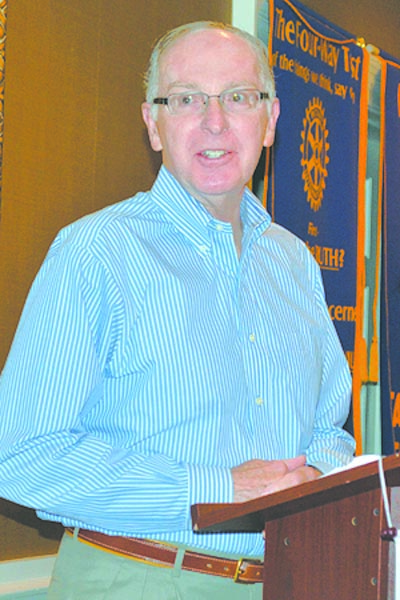Enners remembers brother’s sacrifice in ‘Heart of Gray’
 Richard Enners
Richard Enners
Richard wrote “Heart of Gray,” honoring Ray, a West Point graduate who saved the life of a fellow soldier in Vietnam, only to be killed by gunfire almost immediately thereafter.
Enners, who also graduated from the Military college, shared details from the book before a hushed crowd during a recent Rotary Club of Farragut program.
“Everyone has their own destiny,” began Enners, who described not only a soldier and brother, but also an individual “who was instrumental in making me a better athlete, solider and American.”
Ray was three years Richard’s senior and had many options open to him after his 1967 graduation, but “he wanted to fight for his county,” Enners said.
“It takes a special breed of soldier, to be on the front lines, to risk their life for others in the unit. And [the front lines were] where Iggy wanted to be.
“Iggy chose to serve his nation in the most unpopular war in recent history,” Enners continued, but noted his brother was not alone in wanting to serve.
“Even though it was a complex time, 75 percent of soldiers who served, did so voluntarily.”
While Ray was only in the war for two months, “he demonstrated courage and rescued a wounded soldier,” Enners shared. “He led his platoon on an attack then was fatally wounded — a life extinguished, but a legacy born.
“[Ray] was humble and placed others’ needs before his own; he did what soldiers do…they make the choice of the harder right, instead of the easier wrong.”
For his bravery, Ray posthumously earned the Distinguished Service Cross, which Enners described as “the nation’s second highest award for valor.”
Ray’s legacy encompasses more than his heroic war efforts. Enners also described Ray as “an outstanding” collegiate lacrosse player, and in whose honor two awards are given annually: the First Lt. Raymond J. Enners Award, considered the Heisman Trophy of lacrosse from the U.S. Intercollegiate Lacrosse Association to the best Division I and II intercollegiate players; and the Lt. Raymond Enners Award, which goes to an outstanding high school lacrosse player in Suffolk County, New York, where the Enners brothers grew up.
Raymond has been further memorialized through the recent dedication of Foley-Enners-Nathe Lacrosse Center at West Point.
While Ray’s short but impactful life influenced his younger brother and others who knew him, it was not until recent years that Enners pursued writing a book.
“Initially, I did not plan to write it myself,” he said. “Three prominent authors [whom] I contacted said I must write it, as I knew Raymond the best, also attended West Point, played intercollegiate lacrosse and served in the Army.”
Enners said it took about two and a half years to plan and release the book to Acclaim Press for publication, which is fully titled “Heart of Gray: Lt. Raymond “Iggy” Enners: Courage and Sacrifice of a West Point Graduate in Vietnam.” In addition to using Ray’s own letters, Enners conducted interviews of Ray’s West Point classmates, coaches and those with whom he served and commanded in Vietnam.
“Through that, I was able to get first-hand knowledge of the circumstances surrounding his feat of valor and death. I recorded his final moments based on information given to me,” Richard said.
One of his key interviews was with the soldier his brother had rescued in the moments before his death.
“(Ray’s) selfless nature was what inspired me the most and hopefully inspires those who read the book,” Enners said. “The response from family, friends, classmates and other veterans has been overwhelming. Those who knew him can identify with Ray’s personality, how he led his life and served others.”
Those who did not know him can identify with his acts of selflessness [not] only in combat, but also throughout his brief life.
“Like Gen. George S. Patton Jr. said, ‘It is foolish and wrong to mourn men who died. Rather we should thank God that such men lived.’”


